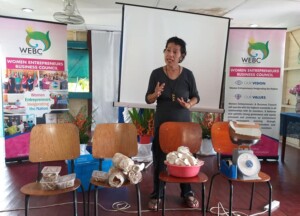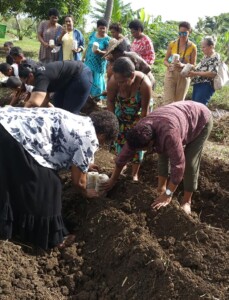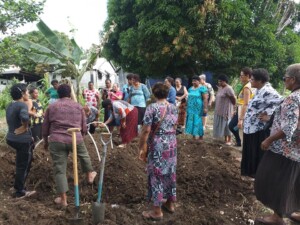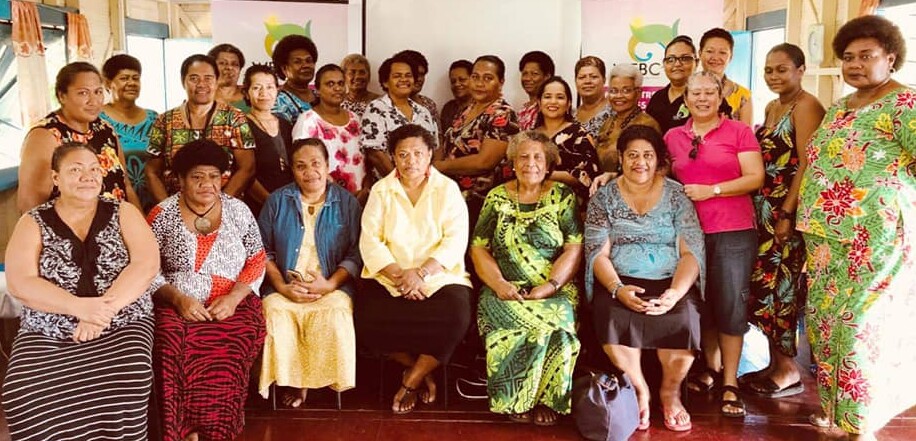Business Continuity Plan helps mushroom farmer survive dual crises
September 21, 2020

By Erica Lee
“When the greenhouse for my mushroom farm blew away during tropical cyclone Harold, quick decision making kept my business afloat in these difficult times.”
Fanny Fiteli, owner of Mama’s Mushrooms and Vice Chair (Western Division) of the Women Entrepreneurs and Business Council (WEBC), says that having a Business Continuity Plan (BCP) helped her respond immediately when tough decisions needed to be made. A BCP identifies and lays out plans for how an organisation or business can keep its essential functions up and running during a time of disruption (e.g. disasters or crises).
“I am so grateful that my husband and I attended the Fiji Commerce and Employers Federation training earlier this year that helped us develop and implement our BCP. Having this allowed us to quickly move our mushroom farm indoors, using up half of our home to plant the new mushrooms.”
Two weeks before this, Fanny’s business had already taken a major hit. The first COVID-19 case had been detected in Fiji in March, which led the Fijian Government to impose movement restrictions in Lautoka City where Fanny’s business is centred.
Fanny with her mushrooms. PC: Fanny Fiteli
 “Both the lockdown and TC Harold greatly impacted my mushroom business, we lost about 70% of our revenue. We were unable to deliver mushrooms to customers outside of Lautoka, the BCP and our business model which relies on contract growers around Fiji like the Naitasiri Women in Dairy Group allowed us to maintain our supply of mushrooms to our regular customers.”
“Both the lockdown and TC Harold greatly impacted my mushroom business, we lost about 70% of our revenue. We were unable to deliver mushrooms to customers outside of Lautoka, the BCP and our business model which relies on contract growers around Fiji like the Naitasiri Women in Dairy Group allowed us to maintain our supply of mushrooms to our regular customers.”
Fanny also used that time to start exploring new business avenues for her mushroom business.
“I didn’t want to see the unsold mushrooms go to waste so I started drying them. I gained a few new customers from this by-product as people see a better product given its longer shelf life. I am still exploring techniques to improve the drying process.”
Learning from her recent hardships, Fanny is now focusing on rebuilding a stronger structure for her mushroom greenhouse and expanding her base of growers around Fiji. Mama’s mushrooms tries to empower unemployed single-stay at home mothers and grandmothers who are unpaid for their care duties. Fanny works with women to start backyard mushroom farms and says that the women can earn between $140 – $200 a week by selling their mushrooms to Mama Mushrooms who then sells it to her clients.
WEBC pivoting to COVID-19 and TC Harold recovery
The Women Entrepreneurs and Business Council (WEBC) is one of the nine councils of the Fiji Commerce and Employers Federation. WEBC advocates for the interests of women entrepreneurs in Fiji with the vision: “Women Entrepreneurs Invigorating the Nation”. Currently the Council has close to 80 members around Fiji ranging from micro enterprises to large businesses.
From its “Care Call Programme” (survey of 71 members) conducted in April, WEBC found that 75% of their members had been adversely affected by the pandemic and TC Harold. The majority of these businesses operate in the Western Division which is heavily reliant on the tourism industry. Whilst some businesses have since regained some of their lost revenue, a handful has reported complete closure of their businesses but have reportedly started new ventures. Since then, WEBC has been able to recruit 15 new members.
Australian Government support through the Australian Humanitarian Partnership and the Fiji Women’s Fund to WEBC has allowed it to carry out activities focused on getting businesses back on their feet through product innovation, livelihoods diversification and the development of contingency plans.
WEBC has been conducting free online and face-to-face “Bridging the Gap” workshops. These workshops provide support to upcoming women entrepreneurs and their members wanting to venture into new forms of business. Sessions focus on social entrepreneurship, inculcating green growth strategy, ideation and diversification, and mushroom farming. These workshops will also be deployed to rural areas through the support of the German Government.



Fanny teaches basic mushroom training in these workshops. From the training, she is now working with six women in the Western Division to set up their own farms who in time will hopefully become contract growers for her. She says three of the women are recently laid off flight attendants who are currently looking for new sources of income.
WEBC is also implementing a seven-month – 14 courses program initiated by the US Embassy in Suva. The program is designed to empower women worldwide to fulfill their economic potential. The Academy for Women (AWE) uses DreamBuilder, an online training program which teaches women to create their own business plans, understand how to raise capital, and connect with networks of successful business owners.
Fanny says there are many opportunities such as information sessions, workshops and funding available to help businesses get back on their feet. She encourages business owners to take advantage of these opportunities and, most importantly, to start putting in place proper plans that could help them better weather future crises that may arise.

WEBC ‘Bridging the Gap’ workshop in Lautoka in June. PC : WEBC
Recent Whats New
Resilience and Sustainability in Action
October 28 2025
Nalini Singh Calls for Collective Feminist Resilience
October 28 2025
